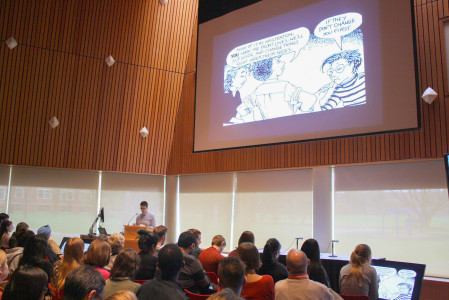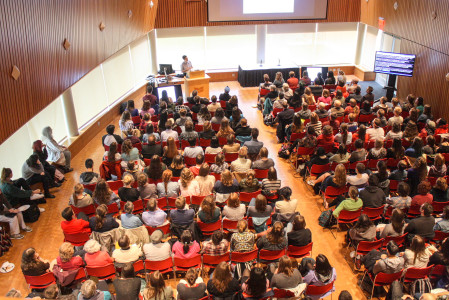
The Bechdel Test, created by convocation speaker Alison Bechdel and used to determine gender bias in media, requires that two women talk to each other about something other than a man. So it follows that cartoonist, graphic novelist and MacArthur Fellowship recipient Alison Bechdel’s visit to campus on April 8 passed the test.
Bechdel is best known for illustrating the comic strip “Dykes to Watch Out For,” which spanned 25 years and followed a group of lesbians in their daily lives. She followed up this endeavor by writing “Fun Home,” a graphic memoir about her father’s gay affairs with his high school students and more recently, “Are You My Mother?” about her relationship with her mother while writing Fun Home. A graduate of Oberlin College, Bechdel came to Grinnell because she enjoys talking with students who read her books in classes.
“At first that was a very odd sensation, knowing that people were being forced to read my work,” Bechdel said. “I’m so reminded of Oberlin when I walk around here: a place where we were in the middle of the cornfields and there was not much to do besides your work.”
Much of Bechdel’s awareness of current events and LGBT issues also dates back to her time at Oberlin.
“I didn’t know that Oberlin was a hotbed of gay and lesbian activism or even progressive politics—I was so clueless,” Bechdel said.
Bechdel recounts reading voraciously in Oberlin’s bookstore and attending many film screenings during her time at college in the midwest. When she started writing “Dykes to Watch Out For,” Bechdel used political events toconnect her characters to the bigger world around them.
“I was always more interested in the drama of the characters’ lives, that was the fun part for me,” Bechdel said. “It was more homework to bring the politics in, but I felt I needed to do that. I wanted to have the story have a larger resonance and not just be about personal lives.”
At her convocation speech, Bechdel also discussed how her process of creating her comics has changed since when she first started drawing “Dykes to Watch Out For” in 1983. With the rise of the Internet and accessibility of design software such as Adobe Illustrator, which she uses to lay out her pages, Bechdel switched from free drawing to relying on Google images for referential pictures.
“I personally would like to move back to relying less on [reference pictures],” Bechdel said. “In the old days, before it was possible to do that, I just drew stuff out of my head because I had to … When I look at [older comics] now, I don’t feel like it’s as good of drawing but there is an energy to it that I think sometimes gets lost when I’m too absorbed in getting something down exactly how it looks. I am always striving to be more spontaneous.”

Halley Freger ’17, who draws comics and considers Bechdel an inspiration, agreed that the new technology creates a tension between drawing more creative illustrations and creating bigger projects faster.
“My interest is in art and tech and the combination of the two,” Freger said. “I think a lot of times people use tech as the answer, like it’s a solution and it’s always so helpful … so hearing about the integration of art and tech is always something I enjoy hearing others talk about.”
When Freger asked Bechdel to sign her book after the convocation speech, she introduced herself as a comic artist. Bechdel then asked if she could see her work, prompting Freger to run to the mailroom to find a copy of her comics in a leftover Grinnell publication. Upon receiving one, Bechdel asked her to sign it.
“I just straight up peed my pants—like, ‘I’m signing something for Alison Bechdel what is happening?’” Freger said. “It was surreal.”
Bechdel may soon be signing playbills for her fans, though. On April 19, the musical adaptation of Bechdel’s “Fun Home” will open on Broadway. After leaving Grinnell, Bechdel will continue to work on her next graphic novel, which will focus on bodies and exercise. She is currently planning a trip to the mountains in the hope that her travels will yield inspiration for illustrations.
Listen to the full talk here:






















































